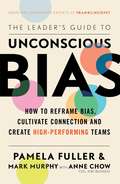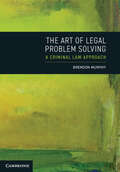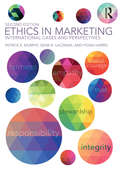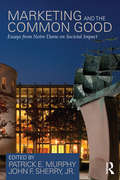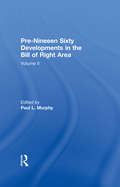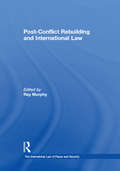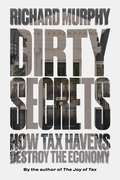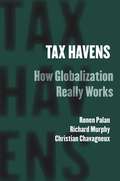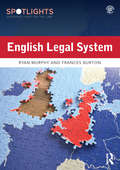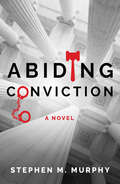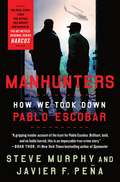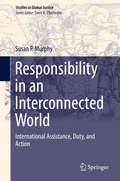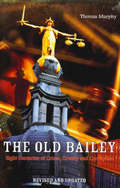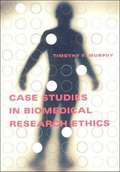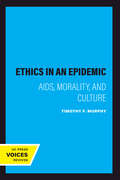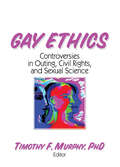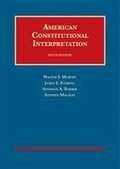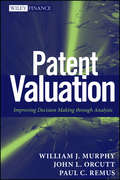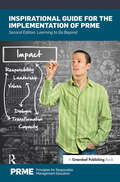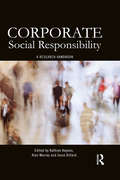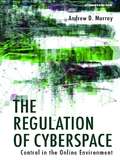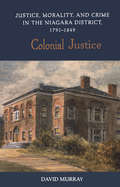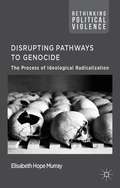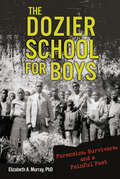- Table View
- List View
Natural Law in Jurisprudence and Politics
by Mark C. MurphyNatural law is a perennial though poorly represented and understood issue in political philosophy and the philosophy of law. In this 2006 book, Mark C. Murphy argues that the central thesis of natural law jurisprudence - that law is backed by decisive reasons for compliance - sets the agenda for natural law political philosophy, demonstrating how law gains its binding force by way of the common good of the political community. Murphy's work ranges over the central questions of natural law jurisprudence and political philosophy, including the formulation and defense of the natural law jurisprudential thesis, the nature of the common good, the connection between the promotion of the common good and requirement of obedience to law, and the justification of punishment.
The Leader's Guide to Unconscious Bias: How To Reframe Bias, Cultivate Connection, And Create High-performing Teams
by Mark Murphy Pamela Fuller Anne ChowA timely, must-have guide to understanding and overcoming bias in the workplace, from the experts at FranklinCovey. Unconscious bias affects everyone. It can look like the disappointment of an HR professional when a candidate for a new position asks about maternity leave. It can look like preferring the application of a red brick university graduate over one from a state school. It can look like assuming a man is more entitled to speak in a meeting than his female junior colleague. Ideal for every manager who wants to understand and move past their own preconceived ideas, Unconscious Bias explains that bias is the result of mental shortcuts, our likes and dislikes, and is a natural part of the human condition. And what we assume about each other and how we interact with one another has vast effects on our organisational success - especially in the workplace. Teaching you how to overcome unconscious bias, this book provides more than thirty unique tools, such as a prep worksheet and a list of ways to reframe your unconscious thoughts. According to the experts at FranklinCovey, your workplace can achieve its highest performance rate once you start to overcome your biases and allow your employees to be whole people. By recognising bias, emphasising empathy and curiosity, and making true understanding a priority in the workplace, we can unlock the potential of every person we encounter.
The Art of Legal Problem Solving: A Criminal Law Approach
by null Brendon MurphyThe Art of Legal Problem Solving: A Criminal Law Approach is a sophisticated skills book designed to help students develop the problem-solving techniques necessary for their legal careers. This succinct yet comprehensive book provides the perfect mix of general instruction and specific examples to encourage students to think about problems both in depth and broadly. It follows a clear roadmap presented in a logical progression, beginning with the fundamentals, fact finding and statutory interpretation before turning to the advanced areas of analysing and writing answers to problem questions. While written primarily for criminal law students, the skills imparted are generic and can be applied equally in any area of the law and in any jurisdiction. The Art of Legal Problem Solving is an indispensable work for law students who want to not only improve their problem-solving skills but master them.
Ethics in Marketing: International cases and perspectives
by Patrick E. Murphy Gene R. Laczniak Fiona HarrisUnderstanding and appreciating the ethical dilemmas associated with business is an important dimension of marketing strategy. Increasingly, matters of corporate social responsibility are part of marketing's domain. Ethics in Marketing contains 20 cases that deal with a variety of ethical issues such as questionable selling practices, exploitative advertising, counterfeiting, product safety, apparent bribery and channel conflict that companies face across the world. A hallmark of this book is its international dimension along with high-profile case studies that represent situations in European, North American, Chinese, Indian and South American companies. Well known multinationals like Coca Cola, Facebook, VISA and Zara are featured. This second edition of Ethics in Marketing has been thoroughly updated and includes new international cases from globally recognized organizations on gift giving, sustainability, retail practices, multiculturalism, sweat shop labor and sports sponsorship. This unique case-book provides students with a global perspective on ethics in marketing and can be used in a free standing course on marketing ethics or marketing and society or it can be used as a supplement for other marketing classes.
Marketing and the Common Good: Essays from Notre Dame on Societal Impact
by Patrick E. Murphy John F. Sherry Jr.Marketing is among the most powerful cultural forces at work in the contemporary world, affecting not merely consumer behaviour, but almost every aspect of human behaviour. While the potential for marketing both to promote and threaten societal well-being has been a perennial focus of inquiry, the current global intellectual and political climate has lent this topic extra gravitas. Through original research and scholarship from the influential Mendoza School of Business, this book looks at marketing’s ramifications far beyond simple economic exchange. It addresses four major topic areas: societal aspects of marketing and consumption; the social and ethical thought; sustainability; and public policy issues, in order to explore the wider relationship of marketing within the ethical and moral economy and its implications for the common good. By bringing together the wide-ranging and interdisciplinary contributions, it provides a uniquely comprehensive and challenging exploration of some of the most pressing themes for business and society today.
Pre-Nineteen Sixty Developments in the Bill of Rights Area
by Paul L. MurphyVolume 2 in the 20-volume series reproducing over 300 key articles which explore the 200-year history of the rights of American citizens. This title contains 23 essays on development of the Bill of Rights from a range of academic authors; features some work found in previously published journals. Such a collection will prove insightful for historians, students of American history and those with a vested interest in historic American law.
Post-Conflict Rebuilding and International Law (The International Law of Peace and Security)
by Ray MurphyThis volume presents the research analysis of a range of scholars and experts on post conflict peacebuilding and international law from a variety of perspectives and missions. The selected essays show that peacebuilding, like the concept of peacekeeping, is not specifically provided for in the UN Charter. They also demonstrate that the record of peacebuilding, like that of peacekeeping, is varied and while both concepts are intrinsically linked, neither lends itself to precise definition. The essays consider the historical approaches to peacebuilding such as the role played by the UN in the Congo in the early 1960s and the work of the United States and its allies in rebuilding Germany and Japan in the aftermath of World War II. Finally, essays consider the major challenge for contemporary peacebuilding operations to make international administrations accountable and to ensure the involvement of the international community in helping rebuild communities and prevent the resurgence of violence.
Dirty Secrets: How Tax Havens Destroy the Economy
by Richard MurphyWhat happens when the rich are allowed to hide their money in tax havens, and what we should do about itThe Panama Papers were a reminder of how the superrich are allowed to hide their wealth from the rest of us. Dirty Secrets uncovers the extent of the corruption behind this crisis and shows what needs to be done in the face of this unregulated spread of rampant greed.Tax havens, we are often told, are part of the global architecture of capitalism, providing a freedom from regulation necessary to make markets work. In this book, leading authority Richard Murphy uncovers the truth behind this lie. The fact of the matter is that this increasingly popular practice threatens the foundations of democracy, sowing mistrust and creating a regime based upon opacity.As Murphy shows, how we manage our economy is a political decision, and one that can be changed. Dirty Secrets proposes ways to regulate tax havens and what the world might look like without them.
Tax Havens: How Globalization Really Works (Cornell Studies in Money)
by Richard Murphy Ronen Palan Christian ChavagneuxFrom the Cayman Islands and the Isle of Man to the Principality of Liechtenstein and the state of Delaware, tax havens offer lower tax rates, less stringent regulations and enforcement, and promises of strict secrecy to individuals and corporations alike. In recent years government regulators, hoping to remedy economic crisis by diverting capital from hidden channels back into taxable view, have undertaken sustained and serious efforts to force tax havens into compliance. In Tax Havens, Ronen Palan, Richard Murphy, and Christian Chavagneux provide an up-to-date evaluation of the role and function of tax havens in the global financial system-their history, inner workings, impact, extent, and enforcement. They make clear that while, individually, tax havens may appear insignificant, together they have a major impact on the global economy. Holding up to $13 trillion of personal wealth-the equivalent of the annual U. S. Gross National Product-and serving as the legal home of two million corporate entities and half of all international lending banks, tax havens also skew the distribution of globalization's costs and benefits to the detriment of developing economies. The first comprehensive account of these entities, this book challenges much of the conventional wisdom about tax havens. The authors reveal that, rather than operating at the margins of the world economy, tax havens are integral to it. More than simple conduits for tax avoidance and evasion, tax havens actually belong to the broad world of finance, to the business of managing the monetary resources of individuals, organizations, and countries. They have become among the most powerful instruments of globalization, one of the principal causes of global financial instability, and one of the large political issues of our times.
English Legal System (Spotlights)
by Ryan Murphy Frances BurtonThis book offers a modern, contemporary and innovative approach to the core curriculum, offering clear explanations to clarify the material without oversimplification. Carefully developed learning tools are used to help students to build their knowledge of the legal system of England and Wales; moreover, all the materials needed by a reader new to legal education are here in one place.English Legal System will also help students to translate knowledge successfully to an assessment situation (whether examination, tutorial preparation or coursework) through the acquisition and development of key skills such as problem solving and application, critical reasoning and evaluation, and research and referencing. The text has been written with the changes to legal education envisaged by the Solicitors Regulation Authority and Bar Standards Board in mind.The focus throughout will be on recent and key case law and contemporary real-life examples, bringing the subject alive and helping students to understand the foundations on which the law in England and Wales is based. The key pedagogic features seek to embed those legal skills within the context of the content on the legal system. The associated website provides a comprehensive learning environment that will provide further illumination of the text and graphics and that caters for a number of different learning styles with additional video and audio content.
Abiding Conviction (A Dutch Francis Thriller #3)
by Stephen M. MurphyLawyer Dutch Francis faces an impossible situation—search for your missing wife or defend your high-profile client Dutch Francis is a defense attorney in the case of a judge accused of killing his wife. Just as the trial is about to begin, Ginnie Turner, Dutch's wife and TV news broadcaster, goes missing. Under extreme duress, Dutch tries to extricate himself as the judge's attorney—or at least postpone the trial. The judge insists that the trial proceed without delay and that Dutch remain his attorney. Exhausted by the murder trial, Dutch confronts an ineffectual police department, suspicious that he is involved in his wife's disappearance. He takes matters into his own hands as he struggles to balance both responsibilities—the trial and finding his wife—pushing him to the brink of losing everything he holds dear. At first Dutch suspects that Ginnie was kidnapped in retaliation for her recent stories about sex scandals. But after receiving bits of her in the mail—fingernails, hair—he realizes the kidnapper's intent may be to punish him. Could his defense of the judge be the reason?Fans of John Grisham and Scott Turow will love the courtroom drama
Manhunters: How We Took Down Pablo Escobar
by Steve Murphy Javier PeñaFor the first time, legendary DEA operatives Steve Murphy and Javier F. Peña tell the true story of how they helped put an end to one of the world’s most infamous narco-terrorists in Manhunters: How We Took Down Pablo Escobar—the subject of the hit Netflix series, Narcos.Colombian drug lord Pablo Escobar’s brutal Medellín Cartel was responsible for trafficking tons of cocaine to North America and Europe in the 1980s and ’90s. The nation became a warzone as his sicarios mercilessly murdered thousands of people—competitors, police, and civilians—to ensure he remained Colombia’s reigning kingpin. With billions in personal income, Pablo Escobar bought off politicians and lawmen, and became a hero to poorer communities by building houses and sports centers. He was nearly untouchable despite the efforts of the Colombian National Police to bring him to justice.But Escobar was also one of America’s most wanted, and the Drug Enforcement Administration was determined to see him pay for his crimes. Agents Steve Murphy and Javier F. Peña were assigned to the Bloque de Búsqueda, the joint Colombian-U.S. taskforce created to end Escobar’s reign of terror. For eighteen months, between July 1992 and December 1993, Steve and Javier lived and worked beside Colombian authorities, finding themselves in the crosshairs of sicarios targeting them for the $300,000 bounty Escobar placed on each of their heads.Undeterred, they risked the dangers, relentlessly and ruthlessly separating the drug lord from his resources and allies, and tearing apart his empire, leaving him underground and on the run from enemies on both sides of the law.Manhunters presents Steve and Javier’s history in law enforcement from their rigorous physical training and their early DEA assignments in Miami and Austin to the Escobar mission in Medellin, Colombia—living far from home and serving as frontline soldiers in the never ending war on drugs that continues to devastate America.
Responsibility in an Interconnected World
by Susan P. MurphyThis monograph opens with an examination of the aid industry and the claims of leading practitioners that the industry is experiencing a crisis of confidence due to an absence of clear moral guidelines. The book then undertakes a critical review of the leading philosophical accounts of the duty to aid, including the narrow, instructive accounts in the writings of John Rawls and Peter Singer, and broad, disruptive accounts in the writings of Onora O'Neill and Amartya Sen. Through an elaboration of the elements of interconnection, responsible action, inclusive engagement, and accumulative duties, the comparative approach developed in the book has the potential to overcome the philosophical tensions between the accounts and provide guidance to aid practitioners, donors and recipients in the complex contemporary circumstances of assistance. Informed by real world examples, this book grapples with complex and multi-dimensional questions concerning practices and the ethics of aid. The author judiciously guides us through the debate between deontological and consequentialist moral theories to arrive at a sophisticated consequentialist account that does justice to the complexity of the problems and facilitates our deliberation in discharging our duty to aid, without yielding, as it should not, a determinate answer for each specific situation. Researchers, students, and practitioners of international aid will all find this book rewarding. Win-chiat Lee, Professor and Chair, Department of Philosophy, Wake Forest University Susan Murphy's book offers us a sophisticated exploration of the philosophical basis for aid. It is grounded in a full understanding of the complexities and pitfalls of the aid industry, but its particular strength lies, mainly through an extensive discussion of Singer, Rawls, O'Neill and Sen, in a comparison of consequentialist and duty-based approaches, eventually endorsing a broad non-idealised, situated consequentialist account in what she calls an interconnected ethical approach to the practice of assistance. For anyone wanting to think carefully about why we should give aid, this book has much to offer. Dr Nigel Dower Honorary Senior Lecturer, University of Aberdeen Author of World Ethics - the New Agenda (2007)
The Old Bailey: Eight Centuries of Crime, Cruelty and Corruption
by Theresa MurphyThis is the story of an arena of crime and degradation, of infamy and human suffering. It is the history of the Old Bailey, an institution as flawed as all man-made attempts at justice are doomed to be.In the beginning there was barbarity and injustice. The court was packed with a restless, muttering mob, eager for the verdicts of 'Guilty' so they could enjoy public executions, hurling abuse and missiles at those with the noose around their neck. Today we fool ourselves that we have evolved beyond barbarism, but are made uneasy by the continuing exposure of miscarriage of justice. If we use the Old Bailey as a yardstick, it is possible to argue that mankind has not made much progress through the centuries. In these pages, we tour the courts of long ago, meeting the Dracula-garbed court chaplains, drunken, brutal judges and cold-blooded hangmen. With wit and skill, Theresa Murphy brings to life a cast of hundreds, from the well-known to the less imfamous, who together make up the harrowing history of the Old Bailey.
Case Studies in Biomedical Research Ethics
by Timothy F. MurphyThis textbook for instruction in biomedical research ethics can also serve as a valuable reference for professionals in the field of bioethics. The 149 cases included in the book are grouped in nine chapters, each of which covers a key area of debate in the field. Some of the case studies are classics, including the famous cases of the Tuskegee Syphilis Study (in which subjects with syphilis were not given treatment) and the Willowbrook hepatitis studies (in which institutionalized subjects were intentionally exposed to hepatitis). Others focus on such current issues as human embryonic stem cell research, cloning by somatic nuclear transfer, and the design and function of institutional review boards. Each chapter begins with a brief introduction that places the issues raised in context; this is followed by a number of cases (each of which is no more than a few pages). Study questions meant to encourage further discussion follow each case. After an introductory discussion of the history and tenets of ethics in medical research, the book's chapters cover the topics of oversight and study design; informed consent; the selection of subjects; conflicts of interest; the social effects of research; embryos, fetuses, and children; genetic research; the use of animals; and authorship and publication. Following these chapters are appendixes with the texts of the Nuremburg Code and the World Declaration of Geneva, two key documents in the establishment of bioethical standards for research. Also included are a glossary, a table of cases by general category, and an alphabetical listing of cases.
Ethics in an Epidemic: AIDS, Morality, and Culture
by Timothy F. MurphyAIDS strikes most heavily at those already marginalized by conventional society. With no immediate prospect of vaccination or cure, how can liberty, dignity, and reasoned hope be preserved in the shadow of an epidemic? In this humane and graceful book, philosopher Timothy Murphy offers insight into our attempts—popular and academic, American and non-American, scientific and political—to make moral sense of pain.Murphy addresses the complex moral questions raised by AIDS for health-care workers, politicians, policy makers, and even people with AIDS themselves. He ranges widely, analyzing contrasting visions of the origin and the future of the epidemic, the moral and political functions of obituaries, the uncertain value of celebrity involvement in anti-AIDS education, the functional uses of AIDS in the discourse of presidential campaigns, the exclusionary function of HIV testing for immigrants, the priority given to AIDS on the national health agenda, and the hypnotic publicity given to "innocent" victims.Murphy's discussions of the many social and political confusions about AIDS are unified by his attempt to articulate the moral assumptions framing our interpretations of the epidemic. By understanding those assumptions, we will be in a better position to resist self-serving and invidious moralizing, reckless political response, and social censure of the sick and the dying.
Gay Ethics: Controversies in Outing, Civil Rights, and Sexual Science
by Timothy F MurphyGay Ethics is an anthology that addresses ethical questions involving key moral issues of today--sexual morality, outing, gay and lesbian marriages, military service, anti-discrimination laws, affirmative action policies, the moral significance of sexual orientation research, and the legacy of homophobia in health care. It focuses on these issues within the social context of the lives of gay men and lesbians and makes evident the ways in which ethics can and should be reclaimed to pursue the moral good for gay men and lesbians.Gay Ethics is a timely book that illustrates the inadequacies of various moral arguments used in regard to homosexuality. This book reaches a new awareness for the standing and treatment of gay men and lesbians in society by moving beyond conventional philosophical analyses that focus exclusively on the morality of specific kinds of sexual acts, the nature of perversion, or the cogency of scientific accounts of the origins of homoeroticism. It raises pertinent questions about the meaning of sexuality for private and public life, civics, and science. Some of the issues covered: Sexual Morality Outing Same-Sex Marriage Military Service Anti-Discrimination Laws Affirmative Action Policy The Scientific Study of Sexual Orientation Bias in Psychoanalysis Homophobia in Health CareGay Ethics presents a wide range of perspectives but remains united in the common purpose of illuminating moral arguments and social policies as they involve homosexuality. The chapters challenge social oppression in the military, civil rights, and the social conventions observed among gay men and lesbians themselves. This book is applicable to a broad range of academics working in gay and lesbian studies and because of its current content, is of interest to an educated lay public. It will be a standard reference point for future discussion of the matters it addresses.
American Constitutional Interpretation (University Casebook Series)
by Walter F. Murphy James E. Fleming Sotirios A. Barber Stephen J. MacedoThis text uses original essays, cases, and materials to study the very enterprise by which a constitution is interpreted and a constitutional government created. It explores the American polity as both a constitutional and democratic entity. This volume is organized around a set of basic interrogatives: What is the constitution that is to be interpreted? Who are its authoritative interpreters? How should they go about their interpretive tasks? The new edition has been updated to include important new cases decided through June 2018, including Masterpiece Cakeshop, Ltd. v. Colorado Civil Rights Commission and National Institute of Family and Life Advocates v. Becerra. To maintain brevity, the authors have removed a number of cases from the casebook and placed them on the accompanying website.
Patent Valuation
by William J. Murphy John L. Orcutt Paul C. RemusA practical resource for valuing patents that is accessible to the complete spectrum of decision makers in the patent processIn today's economy, patents tend to be the most important of the intellectual property (IP) assets. It is often the ability to create, manage, defend, and extract value from patents that can distinguish competitive success and significant wealth creation from competitive failure and economic waste. Patent Valuation enhances the utility and value of patents by providing IP managers, IP creators, attorneys, and government officials with a useable resource that allows them to use actual or implied valuations when making patent-related decisions.Involves a combination of techniques for describing patent valuationIncludes descriptions of various topics, illustrative cases, step-by-step valuation techniques, user-friendly procedures and checklists, and examplesServes as a useable resource that allows IP managers to use actual or implied valuations when making patent-related decisionsOne of the most fundamental premises of the book is that these valuation skills can be made accessible to each of the various decision makers in the patent process. Patent Valuation involves narrative descriptions of the various topics, illustrative cases, step-by-step valuation techniques, user-friendly procedures and checklists, and an abundance of examples to demonstrate the more complex concepts.
Inspirational Guide for the Implementation of PRME: Learning to Go Beyond (The Principles for Responsible Management Education Series)
by Alan Murray Denise Baden Paul Cashian Alec Wersun Kathryn HaynesSince the inception of the United Nations Global Compact sponsored initiative Principles for Responsible Management Education (PRME) in 2007, there has been increased debate over how to adapt management education to best meet the demands of the 21st-century business environment. While consensus has been reached by the majority of globally focused management education institutions that sustainability must be incorporated into management education curricula, the relevant question is no longer why management education should change, but _how_?Following on from the Inspirational Guide for the Implementation of PRME: Placing Sustainability at the heart of Management Education, this casebook highlights the real implementers of responsible management education, and their stories are truly inspirational. The evolving picture underscores the important changes already taking place, and the role of PRME in effecting such change. The clear message is that continuous experimentation, innovation, and learning is required to transform constructs of management education. The new collection contains 27 case stories from universities and business schools spanning Asia, Oceania, Latin America, USA and Canada, Europe, the Middle East and Africa. This important compilation will be an inspiration for all forward-thinking business schools across the world, especially those who are keen to embrace the PRME principles and put sustainability at the heart of their operations.The Guide will be launched at the 2013 PRME Summit – 5th Annual Assembly, hosted by CEEMAN in Bled, Slovenia on 25–26 September, and offered for sale in print and eBook for the first time by Greenleaf Publishing.The first edition of the Inspirational Guide for the Implementation of PRME was presented at the UN Conference on Sustainable Development: Rio+20 Earth Summit in June 2012.Across the PRME community, different concepts are used; most frequently are corporate (social) responsibility, responsible leadership, and sustainable value for business and society.
Corporate Social Responsibility: A Research Handbook
by Alan Murray Kathryn Haynes Jesse DillardConcepts of corporate social responsibility (CSR) are widely used by businesses, professional bodies and academics, but are also widely contested. CSR is usually described as comprising three elements: environmental, economic and social, though there is no serious consensus on how to go about translating ideas into practice. This research handbook addresses some key areas of contention, theory and practice within CSR in order to address, challenge and inform debate in academia and practice. The collaborative text extends understanding of CSR through articulating current thinking on each facet of a vital subject. Each theme is represented by inter-disciplinary discussion of key questions on CSR by researchers and practitioners in the field. In doing so, the book: Explores and critiques CSR goals, and national, organizational and managerial strategies Reviews the distinctive role and importance of CSR to academics, professionals and practitioners and identifies appropriate bridging strategies Evaluates the nature, direction and applicability of selected theoretical dimensions which inform the understanding of CSR Assesses the opportunities for theory building, to support further understanding of the complexities of CSR and the sustainability and long term value of CSR practice to corporations and civil society This timely and significant contribution to the theory and practice of CSR will prove to be vital reading for students, researchers and practitioners involved with the field. It will also become a key reference for anyone with an interest in business and society.
The Regulation of Cyberspace: Control in the Online Environment
by Andrew MurrayExamining the development and design of regulatory structures in the online environment, The Regulation of Cyberspace considers current practices and suggests a regulatory model that acknowledges its complexity and how it can be used by regulators to provide a more comprehensive regulatory structure for cyberspace. Drawing on the work of cyber-regulatory theorists, such as Yochai Benkler, Andrew Shapiro and Lawrence Lessig, Murray explores and analyzes how all forms of control, including design and market controls, as well as traditional command and control regulation, are applied within the complex and flexible environment of cyberspace. It includes chapters on: the role of the cyberlawyer environmental design and control online communities cyber laws and cyber law-making. This book is an essential read for anyone interested in law and information technology.
Colonial Justice
by David MurrayIn 1791 when the Constitutional Act created a legislative assembly for Upper Canada, the colonists and their British rulers decreed that the operating criminal justice system in the area be adopted from England, to avoid any undue influence from the nearby United States. In this new study of early Canadian law, David Murray has delved into the court records of the Niagara District, one of the richest sets of criminal court records surviving from Upper Canada, to analyze the criminal justice system in the district during the first half of the nineteenth century.Murray explores how far local characteristics affected the operation of a criminal justice system transplanted from England; his analysis includes how legal processes affected Upper Canadian morality, the treatment of the insane, welfare cases, crimes committed in the district, and an examination of the roles of the Niagara magistrates, constables, and juries. Murray concludes by arguing that while the principles and culture of British justice were firmly implanted in the Niagara district, this did not prevent justice from being unequal, especially for women and visible minorities. Integrating the stories of the individuals caught up in the legal system, Murray explores law from a local perspective, and illuminates how the Niagara region's criminal justice system operated under hybrid influences from both Britain and the United States.
Disrupting Pathways to Genocide
by Elisabeth Hope MurrayHow does ideology in some states radicalise to such an extent as to become genocidal? Can the causes of radicalisation be seen as internal or external? Examining the ideological evolution in the Armenian genocide, the Holocaust and during the break up of Yugoslavia, Elisabeth Hope Murray seeks to answer these questions in this comparative work.
The Dozier School for Boys: Forensics, Survivors, and a Painful Past
by Elizabeth A. MurraySome true crimes reveal themselves in bits and pieces over time. One such case is the Florida School for Boys, a.k.a. the Dozier School, a place where—rather than reforming the children in their care—school officials tortured, raped, and killed them. Opened in 1900, the school closed in 2011 after a Department of Justice investigation substantiated allegations of routine beatings and killings made by about 100 survivors. Thus far, forensic anthropologist Dr. Erin Kimmerle and her team from the University of South Florida have uncovered fifty-five sets of human remains. Follow this story of institutional abuse, the brave survivors who spoke their truth, and the scientists and others who brought it to light.

